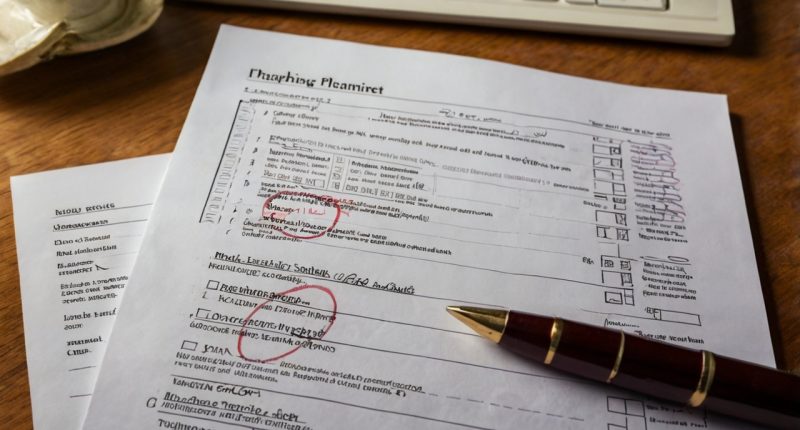Estate planning checklist is a crucial step in securing your financial legacy and ensuring that your assets are distributed according to your wishes. To make this process easier, it’s important to gather all the necessary documents, such as financial records, property deeds, and insurance policies. Creating a will or trust allows you to clearly outline how your assets should be managed and distributed after your passing, and it helps prevent potential disputes among beneficiaries. Proper planning also involves naming beneficiaries for your accounts and policies, which ensures that your assets go directly to those you choose.
In addition to drafting these documents, minimizing taxes on your estate can maximize what you leave behind for your loved ones. An estate plan that considers tax implications will help reduce the burden on your heirs and preserve more of your wealth. This checklist will guide you through the essential steps of estate planning, helping you prepare for the future with confidence and peace of mind.
Table of Contents
Estate Planning Checklist
Estate planning is the process of organizing and managing your assets during your lifetime and deciding how they will be distributed after your death. It involves various strategies, such as creating wills, establishing trusts, and designating beneficiaries, all aimed at ensuring that your wishes are honored and your loved ones are protected.
The primary purpose of estate planning is to provide clarity and peace of mind regarding your legacy. This means specifying who inherits your assets, who will manage your affairs if you become incapacitated, and how to minimize taxes and legal fees associated with transferring your estate. By effectively planning your estate, you can help prevent family disputes and ensure your financial wishes are fulfilled.
Additionally, estate planning can address specific concerns such as pet care, guardianship for minor children, and healthcare decisions, ensuring that all aspects of your life and legacy are taken into consideration. It’s essential to engage in regular reviews of your estate plan, especially after significant life events such as marriage, divorce, or the birth of a child, to keep it aligned with your current circumstances and desires.
Gathering Necessary Documents
Gathering the right documents is a critical step in the estate planning process. This ensures that your wishes are clearly laid out and accessible when needed. Here’s a list of essential documents you should compile:
- Identification Documents: A copy of your ID, such as a driver’s license or passport, is essential for verifying your identity.
- Property Deeds: Collect all titles or deeds for real estate property you own.
- Financial Statements: Bank statements, investment accounts, retirement accounts, and any other financial documents should be included.
- Life Insurance Policies: Ensure you have copies of all life insurance policies, noting the beneficiaries.
- Business Documents: If you own a business, gather its formation documents, operating agreements, and any related financial documents.
- Existing Estate Planning Documents: Any previously created wills or trusts should be collected for reference.
- Tax Returns: Keep copies of your last few tax returns for a complete financial picture.
- Healthcare Documents: Include advance directives, living wills, health care proxies, and any other essential medical documents.
Once you gather these documents, it’s prudent to keep them organized and secured, both physically and digitally. Creating a comprehensive file can streamline the estate planning process and ensures that all necessary information is easily accessible for your beneficiaries and legal representatives when the time comes.
Choosing Beneficiaries and Guardians
One of the most crucial aspects of estate planning is determining who will receive your assets and who will care for your minor children or dependents. This process requires thoughtful consideration to ensure that your intentions are honored and that your loved ones are well cared for in your absence.
Beneficiaries
Beneficiaries are individuals or organizations you designate to inherit your assets after your passing. Here are some important steps to consider when choosing beneficiaries:
- Consider Your Relationships: Think about your close family members, friends, or charitable organizations that hold significance to you. Prioritize those who are financially responsible and likely to honor your wishes.
- Be Specific: Clearly state who will receive specific assets, such as property, investments, and even personal items. This can help avoid disputes among heirs.
- Account for Change: Life circumstances can change, such as marriages, divorces, births, or deaths. Regularly review your list of beneficiaries to ensure it aligns with your current situation.
Guardians
If you have minor children or dependents, choosing a guardian is one of the most important decisions in your estate planning process. Here’s how to approach this sensitive topic:
- Assess Compatibility: Choose someone who shares your values and parenting philosophy. This person should be capable of providing a loving and stable environment for your children.
- Discuss Your Wishes: Before naming someone as a guardian, have an open discussion with them to ensure they are willing and able to take on this responsibility.
- Consider Dual Guardians: You may also want to consider naming alternate guardians in case your first choice is unable or unwilling to serve.
Ultimately, the selections you make for beneficiaries and guardians should reflect your wishes and provide peace of mind that your legacy will be preserved and your loved ones will be secure. Regularly revisiting who you’ve chosen and the reasons behind those choices is a critical step in maintaining a sound estate plan.
Creating a Will or Trust
Creating a will or trust is a crucial step in your estate planning process, as it lays the foundation for how your assets will be distributed after your passing. Understanding the differences between a will and a trust can help you make an informed decision on which option best suits your needs.
Wills: Simplicity and Structure
A will is a legal document that outlines your wishes regarding the distribution of your assets, guardianship of minors, and other important posthumous decisions. It typically goes through probate, which can be a lengthy process.
- Advantages of a Will:
- Easy to create and modify.
- Specifies guardianship for minor children.
- Allows for a clear expression of final wishes.
- Disadvantages of a Will:
- Subject to probate, which can incur costs and delays.
- May become a public document, reducing privacy.
Trusts: Flexibility and Privacy
A trust, on the other hand, can be used to manage your assets during your lifetime and distribute them according to your preferences after your death. Trusts can help avoid probate and provide greater privacy.
- Advantages of a Trust:
- Allows for asset management during your lifetime.
- Avoids probate, facilitating a quicker, more private distribution.
- Can provide detailed instructions and conditions for asset distribution.
- Disadvantages of a Trust:
- Typically more complicated and costly to set up than a will.
- Requires ongoing management and fund transfers into the trust.
Deciding Between a Will and a Trust
When deciding whether to create a will or a trust, consider your unique circumstances, such as the complexity of your estate, the presence of minor children, and your privacy preferences. Additionally, it may be beneficial to consult with an estate planning attorney to ensure that your documents are legally valid and tailored to your wishes.
Ultimately, both a will and a trust can serve as invaluable tools in your estate planning strategy. Making an educated choice between the two can directly impact how well your legacy is secured for future generations.
Minimizing Taxes and Probate
One of the key objectives in estate planning is minimizing taxes and the probate process to ensure that your assets are transferred smoothly to your heirs. Here are several strategies to consider:
Establishing a Revocable Living Trust
A revocable living trust allows you to transfer assets into a trust during your lifetime, which can help avoid probate. Since the assets in the trust do not pass through probate, your heirs can access their inheritance more quickly and without the associated legal costs.
Gifting Assets During Your Lifetime
Consider gifting portions of your estate to your beneficiaries before your passing. The IRS allows individuals to gift a certain amount (currently $17,000 per recipient in 2023) annually without incurring gift taxes. This strategy reduces the size of your taxable estate and can minimize taxes owed upon death.
Taking Advantage of Tax Exemptions
Be aware of the federal estate tax exemption limits. For 2024, the exemption amount is $12.52 million per individual, meaning estates valued below this threshold may not be subject to federal estate taxes. Utilizing this exemption effectively can save your heirs a significant tax burden.
Investing in Life Insurance
Life insurance can be a powerful tool in estate planning. When structured properly, the death benefit can be paid directly to beneficiaries and can be exempt from income tax. Additionally, by setting up an irrevocable life insurance trust (ILIT), you can exclude the life insurance proceeds from your taxable estate.
Working with an estate planning attorney or tax advisor is essential. They can provide personalized strategies tailored to your financial situation, ensuring that your estate plan aligns with current tax laws and regulations.
Reviewing and Updating Regularly
Estate planning isn’t something to set and forget; it requires consistent review and updating to stay relevant to your changing life circumstances. A proactive approach ensures that your estate plan accurately reflects your current wishes, assets, and goals. By periodically reassessing your plan, you can prevent outdated designations and avoid potential complications for your beneficiaries down the road. Regular reviews help you keep your estate plan legally sound, up-to-date, and in line with both personal changes and shifts in the legal landscape.
Life Changes
Major life events can greatly impact your estate plan, making it essential to update your documents accordingly. Significant changes like marriage, divorce, the birth or adoption of a child, or the death of a beneficiary may require modifications to your will, trust, or designated beneficiaries. For instance, if you marry or have a child, you might want to include them as beneficiaries, while a divorce might prompt the removal of your ex-spouse from your plan. Keeping your estate plan aligned with your current family dynamics ensures it reflects your wishes accurately.
Legal and Tax Laws
Estate planning laws, tax codes, and regulations are not static; they change periodically at both state and federal levels. Adjustments in tax rates, exemptions, and inheritance rules can significantly affect your estate plan, potentially creating unanticipated tax burdens for your heirs. Staying aware of these legal changes—and consulting with an estate planning attorney or financial advisor—can help you navigate shifts in the law. Regular updates ensure that your estate plan is designed to maximize efficiency and minimize tax liability for your beneficiaries.
Asset Changes
Your assets will likely evolve over time, whether through growth in value, liquidation, or new acquisitions like property, investments, or valuable collectibles. As these assets fluctuate, it’s vital to reassess your estate plan to reflect your current holdings accurately. For example, new properties or large investments should be accounted for within your will or trust to ensure proper distribution. Updating your estate plan in tandem with changes in your asset portfolio safeguards against unintended oversight, ensuring that all of your possessions are allocated according to your preferences.
Periodic Check-Ups
It’s a good practice to review your estate plan every few years, at a minimum. Consider setting a reminder to evaluate your plan, much like you would for other financial documents. This helps ensure everything remains up to date and fulfills your legacy goals.
By prioritizing regular reviews and updates of your estate planning documents, you can provide peace of mind knowing that your legacy reflects your current desires and protects your loved ones effectively.
Frequently Asked Questions
What is estate planning?
Estate planning is the process of arranging for the management and disposal of a person’s assets in the event of their death or incapacitation.
Why is an estate planning checklist important?
An estate planning checklist is crucial as it ensures that all necessary steps are taken to secure your legacy and that your wishes are clearly outlined and legally documented.
What documents are typically included in an estate planning checklist?
Key documents usually include a will, powers of attorney, healthcare proxies, living wills, and trusts, among others.
Who should consider creating an estate plan?
Anyone with assets, dependents, or specific wishes for their estate, regardless of age or wealth, should consider creating an estate plan.
What is the role of a guardian in estate planning?
A guardian is designated to take care of minor children or dependents in the event that the parents become unable to do so, and their appointment should be clearly specified in your estate plan.
How often should I update my estate plan?
It is advisable to review and update your estate plan every few years or after significant life changes such as marriage, divorce, the birth of a child, or changes in financial status.
Can I create my own estate plan without a lawyer?
While it’s possible to create your own estate plan using online resources and templates, it is recommended to consult with an attorney to ensure that all legal requirements are met and to avoid potential issues.





